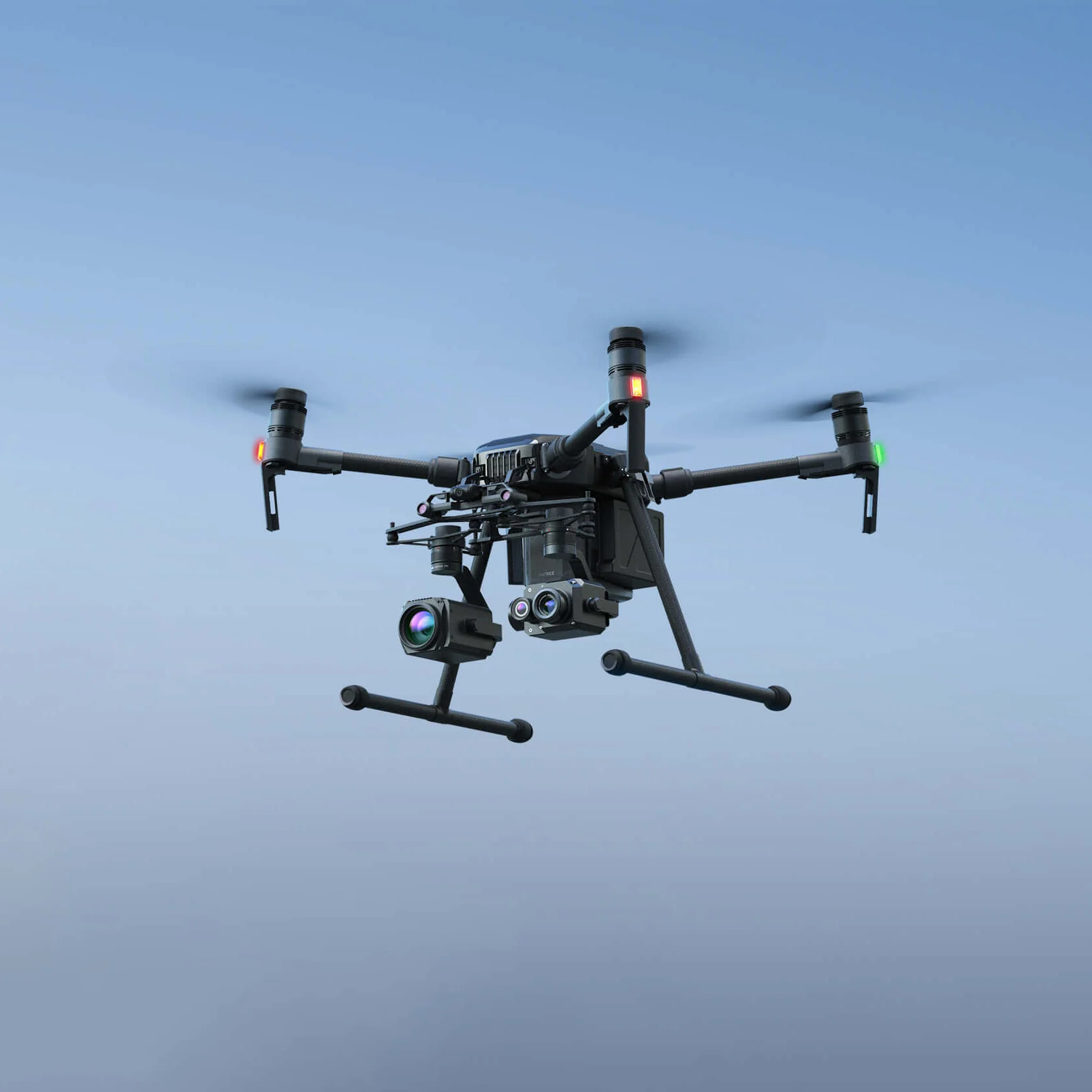
Products
Published on 2 Aug 2017
James Willoughby
DJI Matrice 200 vs Inspire 2
Heliguy compares the Matrice 200 and Inspire 2 to see which is more suited to each industry looking at appearance, performance, battery life and cameras. ... Read More
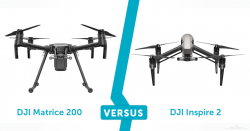
1488196099Matrice_200-small.png DJI Matrice 200 | 1501566605Inspire_2_no_camera-small.png DJI Inspire 2 |
Aircraft
#### Dimensions | 887 x 880 x 378 mm (unfolded) 716 x 220 x 236 mm (folded) | 427 x 317 x 425 mm (without propellers, landing mode) |
#### Diagonal Distance | 643 mm | 605 mm (Landing Mode, Propeller Excluded) |
#### Weight | Approx. 3.80 kg (TB50) Approx. 4.53 kg (TB55) | 3.44 kg (including propellers and two batteries, without gimbal and camera) |
#### Max Takeoff Weight | 6.14 kg | 4 kg |
#### Hovering Accuracy | P-mode with GPS Vertical: ± 0.5m or ± 0.1m (Downward Vision System enabled) Horizontal: ± 1.5m or ± 0.3m (Downward Vision System enabled) | GPS Vertical: ± 0.5m or ± 0.1m (Downward Vision System enabled) Horizontal: ± 1.5m or ± 0.3m (Downward Vision System enabled) |
#### Max Angular Velocity | Pitch: 300°/s Yaw: 150°/s | Pitch: 300°/s Yaw: 150°/s |
#### Max Tilt Angle | P-Mode: 35° (Forward Vision System enabled: 25°) A-Mode: 35° S-Mode: 35° | P-mode: 35° (Forward Vision System enabled: 25°) A-mode: 35° S-mode: 40° |
#### Max Speed | S-Mode: 23 m/s P-Mode: 17 m/s A-Mode: 23 m/s | 26 m/s (Flight forward in S-mode) |
#### Max Ascent Speed | 5 m/s | P-mode/A-mode: 5 m/s S-mode: 6 m/s |
#### Max Descent Speed | Vertical: 3 m/s | Vertical: 4 m/s Tilt: 4-9 m/s |
#### Max Service Ceiling Above Sea Level | 3000 m | 2500 m 5000 m with specially-designed propeller |
#### Max Wind Speed Resistance | 12 m/s | 10 m/s |
#### Max Flight Time | 27 min (No Payload, with TB50) 38 min (No Payload, with TB55) 13 min (Full Payload, with TB50) 24 min (Full Payload, with TB55) | Approx. 27 min (with Zenmuse X4S) |
#### Motor Model | DJI 3515 | DJI 3512 |
#### Propeller Model | DJI 1760S | DJI 1550T |
#### Operating Temperature | -20° to 45°C | -20° to 40°C |
#### IP Rating | IP43 | N/A |
Gimbal
#### Gimbal Installation | Downward | Downward |
#### Compatible Gimbal | Zenmuse X4S, Zenmuse X5S, Zenmuse Z30, Zenmuse XT | Zenmuse X4S, Zenmuse X5S |
Remote Controller
#### Model | GL6D10A | GL6D10A |
#### Operating Frequency | 2.400 - 2.483 GHz 5.725 - 5.850 GHz | 2.400 - 2.483 GHz 5.725 - 5.850 GHz |
#### Max Transmitting Distance (unobstructed, free of interference) | 2.4 GHz: 7 km (FCC); 3.5 km (CE); 4 km (SRRC) 5.8 GHz: 7 km (FCC); 2 km (CE); 5 km (SRRC) | 2.4 GHz: 7 km (FCC); 3.5 km (CE); 4 km (SRRC) 5.8 GHz: 7 km (FCC); 2 km (CE); 5 km (SRRC) |
#### EIRP | 2.4 GHz: 26 dBm (FCC); 17 dBm (CE); 20 dBm (SRRC) 5.8 GHz: 28 dBm (FCC); 14 dBm (CE); 20 dBm (SRRC) | 2.4 GHz: 26 dBm (FCC); 17 dBm (CE); 20 dBm (SRRC) 5.8 GHz: 28 dBm (FCC); 14 dBm (CE); 20 dBm (SRRC) |
#### Video Output Ports | USB, HDMI | USB, HDMI |
#### Power Supply | Built-in battery | Built-in battery |
#### Charging | DJI charger | DJI charger |
#### Dual User Capability | Host-and-Slave connection | Host-and-Slave connection |
#### Mobile Device Holder | Tablet or Smart Phone | Tablet or Smart Phone |
#### Max Mobile Device Width | 170 mm | 170 mm |
#### Output Power | 9 W (Without supplying power to smart device) | 9 W (Without supplying power to smart device) |
#### Operating Temperature | -20° to 45°C | -20° to 45°C |
#### Storage Temperature | Less than 3 months: -20° to 45°C More than 3 months: 22° to 28°C | Less than 3 months: -20° to 45°C More than 3 months: 22° to 28°C |
#### Charging Temperature | 0° to 40°C | 0° to 40°C |
#### Battery | 6000 mAh 2S LiPo | 6000 mAh 2S LiPo |
#### USB Supply Power | iOS: 1 A @ 5.2 V (Max) Android: 1.5 A @ 5.2 V (Max) | iOS: 1 A @ 5.2 V (Max) Android: 1.5 A @ 5.2 V (Max) |
Battery
#### Model | TB50 (Standard) TB55 (Optional) | TB50 (Standard) |
#### Number of Batteries | 2 | 2 |
#### Capacity | 4280 mAh (Standard TB50) 7660 mAh (Optional TB55) | 4280 mAh |
#### Voltage | 22.8V | 22.8V |
#### Battery Type | LiPo 6S | LiPo 6S |
#### Energy | 97.58 Wh (Standard TB50) 176.93 Wh (Optional TB55) | 97.58 Wh |
#### Net Weight | Approx. 520 g (Standard TB50) Approx. 885 g (Optional TB55) | Approx. 520 g |
#### Operating Temperature | -20° to 45°C | -20° to 45°C |
#### Storage Temperature | Less than 3 months: -20° to 45°C More than 3 months: 22° to 28°C | Less than 3 months: -20° to 45°C More than 3 months: 22° to 28°C |
#### Charging Temperature | 5° to 40°C | 5° to 40°C |
#### Max Charging Power | 180 W | 180 W |
Charger
#### Model | IN2C180 | IN2C180 |
#### Voltage | 26.1 V | 26.1 V |
#### Rated Power | 180 W | 180 W |
Forward Vision System
#### Obstacle Sensing Range | 0.7 - 30 m | 0.7 - 30 m |
#### FOV | Horizontal 60° Vertical 54° | Horizontal 60° Vertical 54° |
#### Operating Environment | Surfaces with clear patterns and adequate lighting (> 15 lux) | Surfaces with clear patterns and adequate lighting (> 15 lux) |
Downward Vision System
#### Velocity Range | < 10 m/s at the height of 2 m | < 10 m/s at the height of 2 m |
#### Altitude Range | < 10 m | < 10 m |
#### Operating Range | < 10 m | < 10 m |
#### Operating Environment | Surfaces with clear patterns and adequate lighting (> 15 lux) | Surfaces with clear patterns and adequate lighting (> 15 lux) |
#### Ultrasonic Sensor Operating Range | 10-500 cm | 10-500 cm |
#### Ultrasonic Sensor Operating Environment | Non-absorbing material, rigid surface (thick indoor carpeting will reduce performance) | Non-absorbing material, rigid surface (thick indoor carpeting will reduce performance) |
Upward Infrared Sensor
#### Obstacle Sensing Range | 0 - 5 m | 0 - 5 m |
#### FOV | ±5° | ±5° |
#### Operating Environment | Large-sized object with diffuse relecting surface or high relective rate (>10%) | Large-size non-reflective obstacles |
APP
#### Name | DJI GO 4 | DJI GO 4 |
#### Mobile Device System Requirements | iOS 9.0 or later Android 4.4.0 or later | iOS 9.0 or later Android 4.4.0 or later |
Looking at both aircraft, it's clear the capabilities of each are impressive and ideal for use in many professional industries. The camera and gimbal compatibility, working temperature range and near pinpoint accuracy are just some of the features that make the aircraft so remarkable. Keep reading to see which aircraft is right for you and your industry.
What's in the Box?
Below you'll see what comes with each aircraft:
1488196099Matrice_200-small.png DJI Matrice 200 | * Aircraft Body x 1 * Remote Controller x 1 * Propellers (Pair) x 4 * Intelligent Flight Battery (TB50) x 2 * Battery Charger x 1 * Charging Hub x 1 * Power Cable x 1 * USB Cable (with double A ports) x 1 * Micro SD Card (16GB) x 1 * Vision System Calibration Plate x 1 * Gimbal Damper x 3 * Propeller Mounting Plates x 1 * Carrying Case x 1 * Battery Insulation Sticker x 4 |
* Aircraft Body x 1 * Remote Controller x 1 * Propellers (Pair) x 4 * Intelligent Flight Battery (TB50) x 2 * Battery Charger x 1 * Charging Hub x 1 * Power Cable x 1 * USB Cable (with Double A Ports) x 1 * Micro SD Card (16GB) x 1 * Vision System Calibration Plate x 1 * Gimbal Damper x 3 * Propeller Mounting Plates x 1 * Carrying Case x 1 * Battery Insulation Sticker x 4 | 1501566605Inspire_2_no_camera-small.png DJI Inspire 2 |
The additional contents of each aircraft are very similar as the remote controller, chargers and batteries that come as standard are all the same. Both come with a carry case that is great for transport, however, the M200's case is slightly superior due to its design. It's easier to access the aircraft and the shape makes it more portable.
Appearance
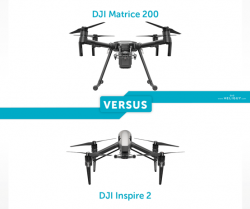
Performance
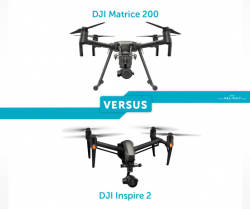
Battery Life
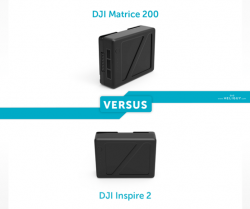
Camera
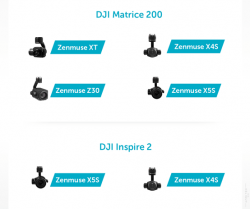
Summary
Both aircraft are some of the most outstanding products from DJI to date but which one would fit in with your needs betters? In Heliguy's opinion, the Matrice 200 is the ideal aircraft for industrial use. Its adaptability with cameras, quick setup and weatherproof design make it a versatile aircraft that can be used for industrial inspections, search and rescue and disaster relief, as well as many other sectors. The Inspire series was built for film makers, especially the Inspire 2. Its image capturing and processing quality are exceptional, giving brilliant results every time. It's fair to say you won't be disappointed by the performance of either aircraft.
Keep checking back to Heliguy Insider for more in-depth VERSUS articles, product overviews and, of course, the latest news from the drone industry.
